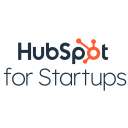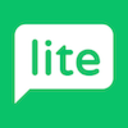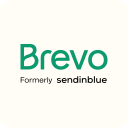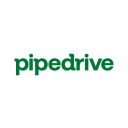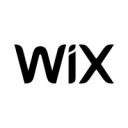Constant Contact vs HubSpot: Deciding on the best marketing solution for your business
- 01Constant Contact vs HubSpot: overview
- 02What's the difference between Constant Contact and HubSpot?
- 03Constant Contact pros and cons
- 04HubSpot pros and cons
- 05Constant Contact compared to HubSpot
- 06HubSpot compared to Constant Contact
- 07Features comparison
- 08Constant Contact vs HubSpot: Which is the best for your business?
- 09Promotions on Email Marketing software
- 10Alternatives to Constant Contact & HubSpot
Access up to $246 savings on Constant Contact & $7,000 on HubSpot
HubSpot
75% off for 1 year
Access up to $246 savings on Constant Contact & $7,000 on HubSpot
Marketing platforms are essential for amplifying your digital marketing strategies. They offer indispensable tools for crafting email marketing campaigns, executing automated marketing strategies, and enhancing overall sales efficiency. However, with a myriad of options available, selecting the most suitable platform for your business's specific marketing requirements can be challenging.
To assist you in this decision-making process, this article delves into a comparison between two widely recognized marketing platforms: Constant Contact and HubSpot. We'll provide an in-depth analysis of their primary features and distinguishable differences. By the conclusion of this article, you'll be equipped with a clearer understanding of which platform, Constant Contact or HubSpot, aligns more effectively with your business's needs.
Constant Contact vs HubSpot: overview
Constant Contact and HubSpot are two prominent figures in the world of digital marketing and customer relationship management, each addressing unique business needs and preferences.
Constant Contact is highly regarded for its proficiency in email marketing. It offers a user-friendly platform that excels in helping businesses craft effective email campaigns for engaging with their audience and driving sales. With a strong emphasis on simplicity and efficiency, Constant Contact provides a range of templates and tools tailored for businesses seeking to enhance their email marketing efforts. On the other hand, HubSpot stands out for its comprehensive suite of marketing tools, encompassing not just email marketing but also CRM, sales, and inbound marketing strategies. HubSpot is ideal for businesses looking for an all-in-one solution to manage various aspects of their marketing and sales funnel, offering advanced features for lead generation, nurturing, and conversion.
The choice between Constant Contact and HubSpot depends largely on your specific business goals and marketing requirements. If your focus is primarily on straightforward, effective email marketing, Constant Contact might be your best bet. However, if you're in search of a more integrated solution that covers a wider range of marketing and CRM functionalities, HubSpot could be the more appropriate choice for your business.
What's the difference between Constant Contact and HubSpot?
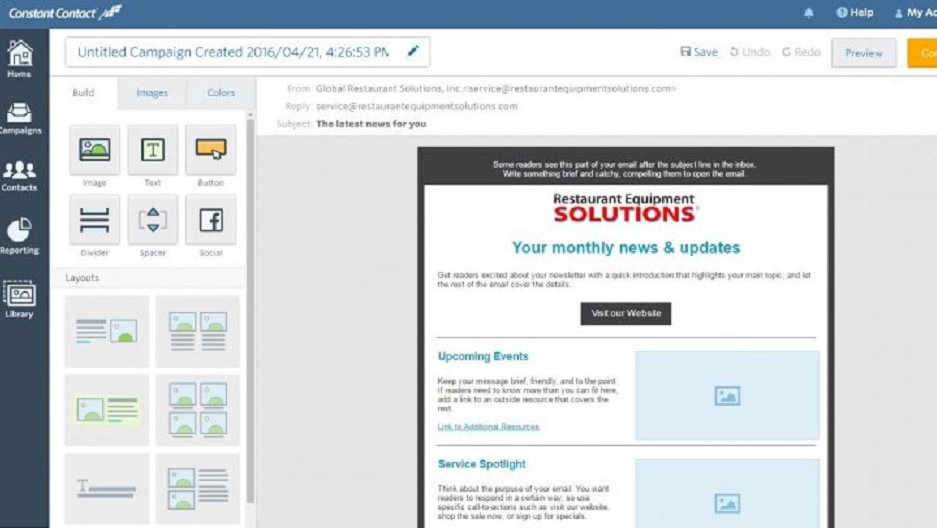

Constant Contact and HubSpot are both robust marketing platforms designed to help businesses grow their audience and convert leads into customers, but they offer different tools and approaches to achieve these goals. Constant Contact is highly focused on email marketing, offering a user-friendly interface for creating, sending, and tracking emails. It's known for its simplicity and effectiveness in managing email campaigns, with features that include customizable templates, contact management, and basic automation to streamline communication.
In contrast, HubSpot provides a more comprehensive inbound marketing suite that includes not only email marketing but also a full CRM, sales funnels, content management, and advanced marketing automation. HubSpot's platform is designed to attract visitors through content creation, convert leads with tailored landing pages and email sequences, and nurture customer relationships with its integrated CRM system. It offers detailed analytics to track customer interactions and the effectiveness of marketing campaigns, enabling businesses to make data-driven decisions.
Regarding forms, Constant Contact provides basic form-building tools to capture lead information, while HubSpot offers more sophisticated form builders with the ability to create dynamic forms that can change based on who is viewing them. HubSpot's forms are directly integrated into its CRM, allowing for more advanced lead nurturing strategies.
Pricing is another area of distinction. Constant Contact offers tiered pricing based on the number of contacts, starting with a basic plan that caters to small businesses looking to manage their email marketing. HubSpot's pricing is structured around the 'Hubs' — Marketing, Sales, Service, and CMS — each of which can be purchased separately or bundled together. The cost increases with the addition of more advanced features and tools, which are designed to cater to businesses with more complex needs and larger operations.
Choosing between Constant Contact and HubSpot comes down to the scale of your marketing needs, the complexity of your customer journey, and the level of integration you desire with other business functions. For those focused solely on email marketing, Constant Contact may be sufficient, whereas HubSpot is better suited for businesses seeking a comprehensive, all-in-one marketing solution.
Constant Contact pros and cons
What are the advantages of Constant Contact?
- User-friendly interface: Constant Contact is known for its straightforward and intuitive interface, which makes it easy for users of all skill levels to create and manage their email marketing campaigns without requiring technical expertise.
- Extensive template library: The platform offers a wide variety of customizable templates, which allows businesses to create professional-looking emails quickly.
- Strong deliverability rates: Constant Contact has a reputation for high deliverability rates, ensuring that emails reach the recipients' inboxes and not the spam folder.
- Effective contact management: It provides tools to segment lists, manage contacts, and track customer interactions, enabling targeted and personalized email campaigns.
- Educational resources and support: The company offers a wealth of resources, including live webinars, tutorials, and community forums. Additionally, they provide excellent customer support.
What are the disadvantages of Constant Contact?
- Limited automation features: Compared to other platforms, Constant Contact's automation capabilities are somewhat basic, which might not be sufficient for businesses looking for complex automation workflows.
- Pricing: While they offer a free trial, Constant Contact can be more expensive than some competitors, especially as your contact list grows, since pricing is based on the number of contacts.
- No advanced CRM features: Unlike some of its competitors, Constant Contact does not offer a built-in comprehensive CRM system, which can be a downside for businesses looking for an all-in-one solution.
- Limited integration options: The number of third-party integrations offered by Constant Contact is fewer than what’s available with other marketing platforms like HubSpot, which might limit functionality for some users.
- Basic analytics: While Constant Contact does provide reporting on campaign performance, the analytics might not be as in-depth as more advanced users would prefer, particularly when it comes to tracking user behavior or customizing reports.
Compare Constant Contact to other tools
HubSpot pros and cons
What are the advantages of HubSpot?
- All-in-one platform: HubSpot offers a comprehensive suite of tools that encompass CRM, sales, marketing, and customer service, all integrated into a single platform, which streamlines processes and data management.
- Advanced marketing automation: The platform provides powerful automation capabilities that allow for sophisticated marketing strategies, such as personalized email workflows and lead nurturing programs.
- Extensive integration capabilities: HubSpot has a vast ecosystem of integrations, allowing businesses to connect a multitude of services and tools, enhancing the platform's functionality and customizability.
- Inbound marketing strategy: HubSpot is built around the inbound marketing methodology, offering tools for content management, SEO, and social media marketing, which help attract and engage customers organically.
- Detailed analytics and reporting: The platform offers deep analytics and reporting features, giving businesses detailed insights into their marketing campaigns, customer interactions, and overall performance.
What are the disadvantages of HubSpot?
- Complexity: While HubSpot's extensive features are powerful, they can be overwhelming for small businesses or those new to inbound marketing, resulting in a steep learning curve.
- Cost: HubSpot can be expensive, particularly as businesses grow and require more advanced features. The pricing can escalate quickly as additional functionalities are needed.
- Overwhelming for simple needs: For businesses that only need basic email marketing or CRM tools, HubSpot's wide array of features can be excessive, making simpler, more focused platforms a better fit.
- Inflexible pricing tiers: The platform's pricing is structured in a way that may force businesses to pay for additional features they don’t need just to obtain the few advanced features they do need.
- Performance issues with large databases: Some users report that the CRM can slow down when handling a large number of records, which can impact the user experience and efficiency.
Compare HubSpot to other tools
Constant Contact compared to HubSpot
Constant Contact is acclaimed for its straightforward email marketing solutions, offering an accessible platform with a plethora of templates, making it a favorite among small to medium businesses focusing on direct email strategies.
In contrast, HubSpot serves as a more holistic marketing hub, integrating a wide array of tools from CRM to advanced automation and analytics, catering to businesses aiming for a comprehensive inbound marketing approach. While Constant Contact shines in user-friendliness and dedicated support, HubSpot stands out for its all-encompassing ecosystem, ideal for scaling businesses seeking a unified platform for all their marketing, sales, and service needs.
Is Constant Contact better than HubSpot?
Determining whether Constant Contact is better than HubSpot hinges on specific business needs. For those seeking a specialized, easy-to-use platform for email marketing, Constant Contact is often the preferred choice with its intuitive design and focused approach. Conversely, HubSpot offers a robust, all-in-one marketing solution with CRM, automation, and analytics, ideal for businesses looking to implement a comprehensive inbound marketing strategy.
Therefore, Constant Contact may be superior for email-centric campaigns, while HubSpot excels for organizations desiring a broad suite of marketing tools for a more integrated approach to their marketing, sales, and customer service efforts.
What is Constant Contact best used for?
Constant Contact is best utilized for its core strength—streamlined email marketing campaigns. It's an ideal platform for small to medium-sized businesses looking to connect with their audience through regular newsletters, promotional emails, and event announcements. With an array of customizable templates and a user-friendly interface, it simplifies the creation and management of email campaigns, making it accessible even to those with minimal marketing experience.
Constant Contact also offers effective list management and reporting features, which aid businesses in monitoring campaign success and refining their strategies to better engage subscribers and drive conversions.
Can Constant Contact replace HubSpot?
Constant Contact may replace HubSpot for businesses whose primary focus is email marketing, thanks to its specialized tools and simplicity. However, for organizations seeking an extensive suite of marketing tools that includes CRM, advanced automation, content management, and detailed analytics, Constant Contact might fall short. It excels in its niche, but HubSpot's broad functionalities cater to a more integrated approach to inbound marketing and sales.
The choice between the two depends on the complexity of a business's needs and whether a comprehensive solution or a targeted email marketing strategy is the priority.
Is Constant Contact cheaper than HubSpot?
Constant Contact generally offers a more cost-effective solution than HubSpot, especially for businesses focused solely on email marketing. Constant Contact’s pricing is structured to support small to medium-sized businesses with straightforward, tiered plans based on the size of the email list. HubSpot, with its extensive range of marketing, sales, and service tools, comes at a higher price, reflecting its position as an all-in-one inbound marketing platform.
While HubSpot's starting plans may overlap with Constant Contact's pricing, the cost can increase significantly with the addition of advanced features and functionalities, making Constant Contact the more budget-friendly option for email-centric initiatives.
Is there a better Email Marketing software than Constant Contact?
When selecting the ideal software for your marketing efforts, it's crucial to consider other options beyond Constant Contact, particularly in the niche of email marketing and marketing automation.
Key alternatives to Constant Contact include Mailchimp, Brevo (ex. Sendinblue), GetResponse, and AWeber.
The decision to choose the most appropriate software hinges on several aspects like the depth of email automation required, pricing considerations, the scale of your contact list, and the nature of your marketing campaigns. Constant Contact is favored for its user-friendly setup and dedicated email marketing focus. Nevertheless, investigating these alternatives may lead you to a service that more precisely fits your marketing objectives and offers the specific features you value.
50% off for up to 1 year on the Core and Plus plans. on Constant Contact
Get 50% off for up to 1 year on the Core and Plus plans. on Constant Contact and up to $246 savings with Secret.
HubSpot compared to Constant Contact
HubSpot and Constant Contact cater to digital marketing needs but differ significantly in scope and functionality. HubSpot stands as a comprehensive inbound marketing platform, integrating a wide array of tools including CRM, advanced marketing automation, SEO, and content management, tailored for businesses seeking a holistic approach to their online presence. Its extensive features suit larger enterprises or those requiring detailed analytics and sales integration.
In contrast, Constant Contact specializes in email marketing, offering a more focused and user-friendly experience. Ideal for small to medium-sized businesses, it emphasizes ease of use and efficiency in managing targeted email campaigns, with a simpler, more direct approach compared to HubSpot's broad suite of services.
Is HubSpot better than Constant Contact?
Whether HubSpot is better than Constant Contact largely depends on the specific needs and scale of a business. HubSpot offers a comprehensive suite of tools that cover a wide range of marketing, sales, and CRM functionalities, making it a robust choice for businesses seeking an all-encompassing platform. Its advanced features cater well to larger enterprises or those with complex marketing strategies.
On the other hand, Constant Contact shines in the realm of email marketing with its user-friendly interface and focused tools, ideal for small to medium-sized businesses prioritizing direct email communication. Thus, the better choice varies based on the business’s goals, size, and the complexity of marketing needs.
What is HubSpot best used for?
HubSpot is best utilized as an all-in-one inbound marketing platform, effectively serving businesses that seek to integrate their marketing, sales, and customer service efforts. It excels in automating and streamlining marketing processes, offering tools for SEO, content management, social media marketing, and lead nurturing. The platform's built-in CRM is a standout feature, enabling seamless tracking and management of customer interactions across different channels.
HubSpot is also renowned for providing detailed analytics and insights, which are invaluable for developing and refining marketing strategies. It's particularly well-suited for medium to large businesses looking for a comprehensive tool to manage and enhance their entire marketing and sales funnel.
Can HubSpot replace Constant Contact?
HubSpot can replace Constant Contact, particularly for businesses seeking more than just email marketing. While Constant Contact excels in targeted email campaigns with its user-friendly approach, HubSpot offers a broader range of marketing tools, encompassing CRM, automation, content management, and analytics. This makes it suitable for enterprises aiming for a comprehensive marketing strategy beyond email.
HubSpot’s all-in-one platform streamlines various marketing activities, offering deeper insights and integration across sales and customer relationship management. For businesses whose needs have grown to include these broader functions, HubSpot stands as a robust alternative, albeit at a potentially higher cost and complexity.
Is HubSpot cheaper than Constant Contact?
Comparing the cost of HubSpot to Constant Contact, HubSpot generally emerges as the more expensive option, primarily due to its extensive range of features. HubSpot’s pricing offers an all-encompassing suite of marketing tools, including CRM, advanced automation, and analytics, which cater to a comprehensive inbound marketing strategy. This broad functionality reflects in HubSpot’s pricing, making it more suitable for businesses seeking an integrated marketing platform.
Conversely, Constant Contact, focusing primarily on email marketing, presents a more budget-friendly choice, especially for small to medium-sized businesses with specific email campaign needs. Thus, for email-centric marketing efforts, Constant Contact typically offers a more cost-effective solution.
Is there a better Prospecting software than HubSpot?
When considering alternatives to HubSpot in the realm of marketing automation and CRM software, it's important to assess whether another platform better suits your specific business needs.
Key alternatives to HubSpot in this space include Salesforce, Marketo, Marketing Cloud Account Engagement (ex. Pardot), and Zoho CRM. Each of these platforms brings its own strengths and specialties, catering to different aspects of marketing and customer relationship management. While HubSpot is renowned for its comprehensive, all-in-one approach, these alternatives could offer features or pricing structures that align more closely with your particular business goals. Whether you require more focused CRM capabilities, advanced marketing automation, or different pricing models, exploring these options can lead to a solution that more precisely fits your business needs, potentially offering advantages over HubSpot in specific areas.
75% off for 1 year on HubSpot
Get 75% off for 1 year on HubSpot and up to $7,000 savings with Secret.
Features comparison
Constant Contact Provides More Comprehensive Performance Reports than HubSpot

In the critical area of performance reporting, particularly for email marketing, Constant Contact demonstrates a clear advantage over HubSpot. It excels with detailed email tracking reports, a feature pivotal for businesses focused on email-driven sales strategies. These reports provide insights into key metrics like open rates, click-through rates, and subscriber behavior, enabling users to pinpoint exactly how recipients are interacting with their emails. This level of detail is instrumental in understanding where prospects are in the sales cycle, thereby allowing for more targeted and effective follow-up strategies.
While HubSpot does offer robust and customizable dashboards and reports, its focus is more spread across its broader range of marketing tools. HubSpot's reporting capabilities are comprehensive, encompassing various aspects of CRM and inbound marketing, but they may not delve as deeply into the specifics of email campaign performance as Constant Contact's reports do.
Constant Contact Outshines HubSpot in User-Friendliness

When assessing ease of use, Constant Contact notably surpasses HubSpot. Known for its intuitive and straightforward interface, Constant Contact simplifies the user experience, making it exceptionally accessible for novices and experts alike. For instance, when creating email campaigns, users benefit from its drag-and-drop editor and pre-designed templates, enabling swift and effortless campaign creation. Analyzing campaign results is equally straightforward, with clear, concise metrics.
Contrastingly, HubSpot, despite its rich array of features encompassing CRM, content management, and advanced analytics, presents a more complex interface. This comprehensiveness, while beneficial for in-depth marketing strategies, can pose a steep learning curve for beginners, potentially leading to initial overwhelm. Thus, for users prioritizing simplicity and ease of navigation in their email marketing endeavors, Constant Contact distinctly stands out as the more user-friendly option compared to HubSpot.
HubSpot Leads in Integration Capabilities Over Constant Contact

HubSpot clearly outperforms Constant Contact in terms of integration capabilities, offering a diverse and extensive range of options. HubSpot's platform seamlessly integrates with a vast array of tools across various domains like CRM, sales, marketing, service, connectivity, and content management systems. For instance, its CRM integrations extend beyond basic data syncing, enabling advanced sales and marketing automation that syncs with tools like Salesforce and Microsoft Dynamics. Similarly, its marketing integrations include advanced analytics tools like Google Analytics and advertising platforms like Facebook Ads, enhancing marketing campaign effectiveness.
In contrast, Constant Contact, while proficient in its domain, offers a more limited range of integrations. It covers essential integrations with e-commerce platforms such as Shopify, website builders like WordPress, and financial tools like QuickBooks. However, these integrations are more focused on facilitating email marketing rather than providing a holistic business solution.
HubSpot Leads in Sales Pipeline Management Over Constant Contact
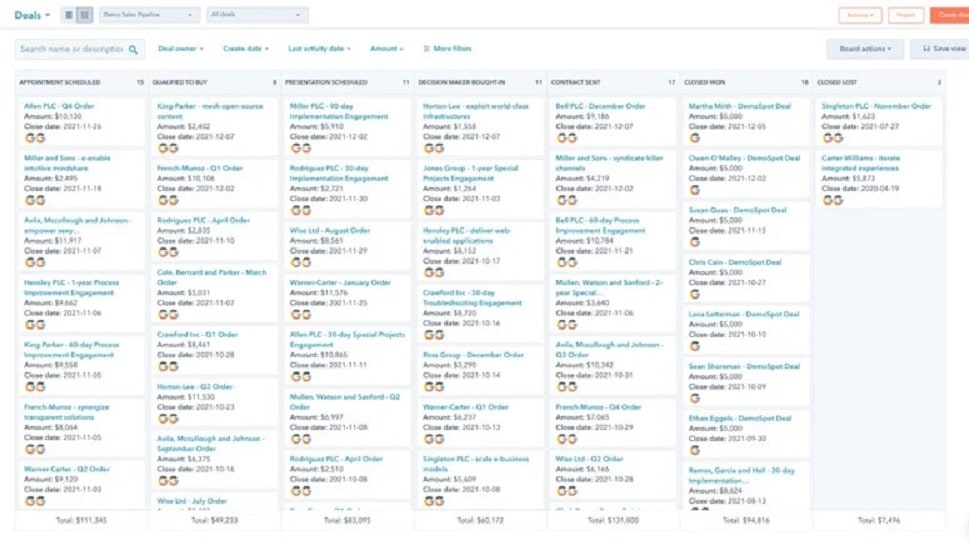
In the realm of sales pipeline management, HubSpot distinctively outshines Constant Contact. While Constant Contact is adept at tracking and analyzing the performance of email marketing campaigns, HubSpot takes it a step further by offering an integrated and comprehensive solution for managing the entire sales process. With HubSpot, businesses can not only track but also organize and nurture their sales opportunities and deals more effectively.
HubSpot’s intuitive interface features a customizable sales pipeline, where different stages and milestones of the sales cycle can be visually represented and tailored to a business’s specific sales process. This allows for a clear visualization and better control over each stage of the sales journey, from initial contact to closing deals. For instance, sales teams can set up multiple pipelines for different products or services, track the progress of deals with drag-and-drop functionality, and even automate follow-up tasks.
HubSpot Triumphs in Lead Scoring and Segmentation Over Constant Contact

In the crucial aspects of lead scoring and segmentation, HubSpot clearly surpasses Constant Contact. HubSpot's sophisticated system allows for assigning scores to leads based on their interactions and engagement levels, a capability that is significantly more advanced than Constant Contact's basic list-building feature. This scoring system enables businesses to prioritize leads effectively, focusing their efforts on those most likely to convert.
Moreover, HubSpot employs predictive lead scoring, utilizing machine learning to forecast which leads have the highest potential for conversion. This advanced feature is particularly beneficial for businesses with a large volume of leads, as it streamlines the sales process by identifying the most promising prospects.
In contrast, while Constant Contact provides useful tools for segmenting email lists and managing contacts, its functionalities in lead scoring are not as developed. It primarily focuses on categorizing contacts based on straightforward criteria like demographics or past interactions, without the added sophistication of behavior-based scoring or predictive analytics.
HubSpot Outperforms Constant Contact in Content Management Flexibility
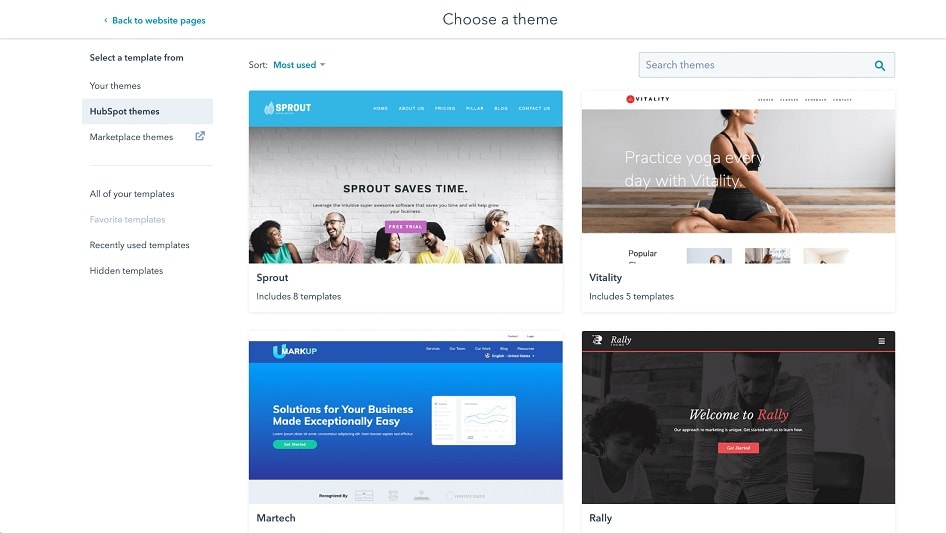
When comparing content management features, HubSpot clearly has the upper hand over Constant Contact. Constant Contact offers a range of predefined templates that simplify the creation of emails and landing pages, catering to users seeking ease and speed. These templates allow for basic customization, making them suitable for straightforward email campaigns and web pages.
In contrast, HubSpot’s content management system (CMS) provides a more interactive and versatile experience. Its drag-and-drop editor enables users to construct dynamic and responsive landing pages and websites with greater creative control. Users can add various elements like CTAs, forms, and custom HTML, allowing for a more personalized and engaging web presence.
Constant Contact and HubSpot are Equally Efficient in Marketing Automation

In the arena of marketing automation, both Constant Contact and HubSpot demonstrate remarkable capabilities, albeit with different focuses. Constant Contact offers efficient email automation features, enabling businesses to send a series of emails triggered by subscriber actions such as sign-ups or event registrations. This level of automation is particularly effective for maintaining engagement and nurturing leads through tailored communication.
On the other hand, HubSpot broadens the scope of automation beyond just email. It includes automating repetitive tasks across the marketing and sales funnel, like lead nurturing processes, sales sequences, and even social media interactions. For example, HubSpot can automatically assign leads to sales representatives based on specific criteria or trigger internal notifications when a prospect reaches a particular stage in the buying journey.
Subscribe to our newsletters.
No FOMO here. Stay up-to-date on all the latest deals and news with our monthly newsletter straight to your inbox like 112,000+ entrepreneurs (+ Get 10% off on on our Premium Membership!)
Constant Contact vs HubSpot: Which is the best for your business?
Constant Contact is the best tool for you if:
- You prioritize simplicity and ease of use in email marketing, offering an intuitive platform ideal for beginners and small businesses.
- Your focus is primarily on email marketing campaigns, with a range of customizable templates and automation options for effective engagement.
- You're looking for affordable pricing structures, particularly well-suited for small to medium-sized businesses with a limited marketing budget.
- You value strong customer support and educational resources, providing extensive guides, webinars, and responsive support for a seamless experience.
- You require basic integrations with key platforms like Shopify and WordPress, efficiently linking your email marketing with your business ecosystem.
HubSpot is the best tool for you if:
- You need an all-in-one marketing solution, integrating CRM, content management, advanced automation, and analytics for a comprehensive marketing strategy.
- Your business demands sophisticated marketing automation and lead management, offering personalized email workflows, lead scoring, and predictive analytics.
- You're looking for a platform with extensive integration capabilities, seamlessly connecting with a wide range of sales, service, and marketing tools.
- You require in-depth analytics and reporting to make data-driven decisions, providing detailed insights into customer interactions and campaign performance.
- Your business has complex sales processes and needs a robust CRM system to manage customer relationships and streamline sales activities.
Alternatives to Constant Contact & HubSpot
Promotions on Email Marketing software
Start saving on the best SaaS with Secret.
Secret has already helped tens of thousands of startups save millions on the best SaaS like Constant Contact, HubSpot & many more. Join Secret now to buy software the smart way.


